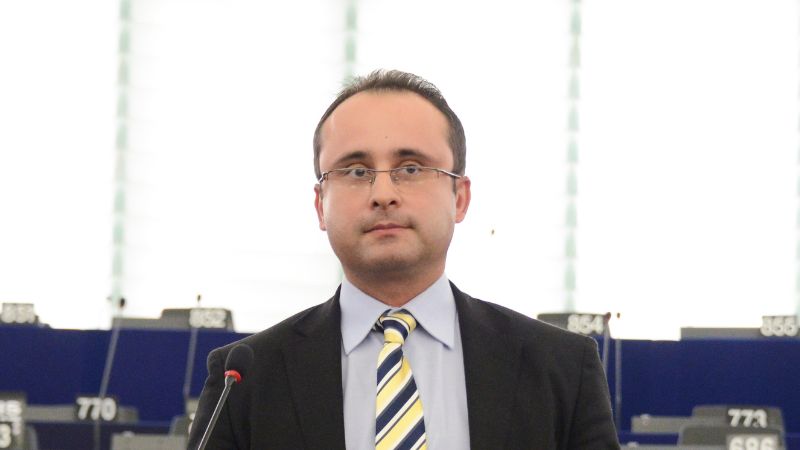Supporting a new wave of research in amyotrophic lateral sclerosis
MEP Cristian-Silviu Buşoi, Chair of the Industry, Research and Energy Committee
Every year on the 21st of June, people around the world celebrate Global ALS Awareness Day, a day to show support to the fight against amyotrophic lateral sclerosis (ALS). ALS is a fatal, progressive, and rare neurodegenerative disease affecting nerve cells that control voluntary muscle movement.
While it is considered a rare disease, with a prevalence of 4.5 cases per 100,000 individuals, it is estimated that about 12,000 individuals are diagnosed with ALS each year in Europe. Despite a lack of treatment options, there has been a spur of innovative research in ALS, particularly focused on the genes associated with the disease and their role in the development of ALS.
The European Union is ideally placed to support existing research and help accelerate progress towards finding breakthroughs therapies for ALS patients. As for other rare diseases, research in ALS is challenging due to scarce knowledge of the disease and limited patient population. This is why a strong and stable EU regulatory and incentive framework for rare diseases is paramount to fostering research in areas such as ALS. The EU Orphan Medicines Regulation is a great example of how the EU can drive innovation where it is needed the most and remains essential to managing the challenges related to the development of treatments for rare diseases.

“A strong and stable EU regulatory and incentive framework for rare diseases is paramount to fostering research in areas such as ALS”
Much more can be done at European level to support research and care in ALS and rare diseases in general. A European Action Plan on Rare Disease should be put in place to improve patient access to diagnosis, information, and treatment, addressing the broad inequalities existing across Europe. The European Reference Networks (ERNs) could play a key role in facilitating patients access to specialised diagnosis, in particular genetic testing. ERNs could also provide a bridge between patient care and research, supporting the identification of biomarkers, the creation of registries, and facilitating the identification of patients for clinical trials. Finally, creating a strong rare disease research and development ecosystem in Europe requires further investments and better linking the European Joint Programme on Rare Diseases, ERNs, and the emerging European Health Data Space.
All in all, Global ALS Awareness Day calls on all EU stakeholders to work together so that all people diagnosed with ALS have the same chances of accessing timely and life-saving treatment in the EU.
The importance of genetic testing in the fight against ALS

Alessandro Tempra, Head of Public Policy & Government Affairs, Europe, Canada and Partner Markets, Biogen
Amyotrophic lateral sclerosis (ALS) is a rare, neurodegenerative disease characterised by motor neuron loss in the brain and spinal cord. While its onset and course of disease are heterogeneous, ALS is always fatal. Death typically occurs within 3 to 5 years of symptom onset. To date, there is no cure and only limited treatment options exist for people diagnosed with the disease.
ALS has traditionally been classified as familial – with a known history of the disease within the family – or sporadic, where there is no known family history. Both forms can, however, have genetic origins. In fact, in around 10% of all ALS cases, a specific genetic mutation can be identified as the cause. Half of these patients do not have a known family history.
Over 25 genes have been implicated in ALS so far. To understand whether and which genetic mutation is behind a case of ALS, the patient needs to undertake a genetic test. Genetic testing for ALS – and rare diseases more generally – plays a crucial role in the patient pathway, ensuring timely and correct diagnosis.
Genetic testing allows patients and their families to better understand their condition, empowering them with the knowledge to make informed decisions regarding their healthcare and life choices. This is essential when a treatment is available but is also important to further research in rare diseases, where small patient populations and limited knowledge of the disease are important barriers to progress.
If properly diagnosed, an ALS patient may decide to enrol in clinical trials, helping researchers in advancing research for this terrible disease. As genetically targeted therapies are being developed and may become available to patients soon, a precise diagnosis is paramount.
“Biogen, jointly with leading medical experts and the ALS patient community, is working to ensure that every person diagnosed with ALS is offered timely, accessible genetic testing and counselling”
Unfortunately, most patients in Europe are currently not invited to undertake a genetic test in the absence of known family history, leaving many patients without a precise diagnosis. There are wide inequalities with regard to genetic testing for rare diseases across Europe. In some countries, genetic testing is not reimbursed as part of the national health insurance due to the lack of a treatment. In others, waiting time remains high due to limited capabilities of the national healthcare system.
Biogen, jointly with leading medical experts and the ALS patient community, is working to ensure that every person diagnosed with ALS is offered timely, accessible genetic testing and counselling. The European Commission could play an important role in addressing existing inequalities and helping the creation of a framework for awareness and best practice sharing on genetic testing. EU Member States should also collaborate to put in place evidence-based guidelines for appropriate use of genetic testing in routine clinical management of patients with ALS and their extended families. Only by working together, we can transform the lives of people with ALS.
This content was commissioned by Biogen and produced by Dods Impact
Sign up to The Parliament's weekly newsletter
Every Friday our editorial team goes behind the headlines to offer insight and analysis on the key stories driving the EU agenda. Subscribe for free here.